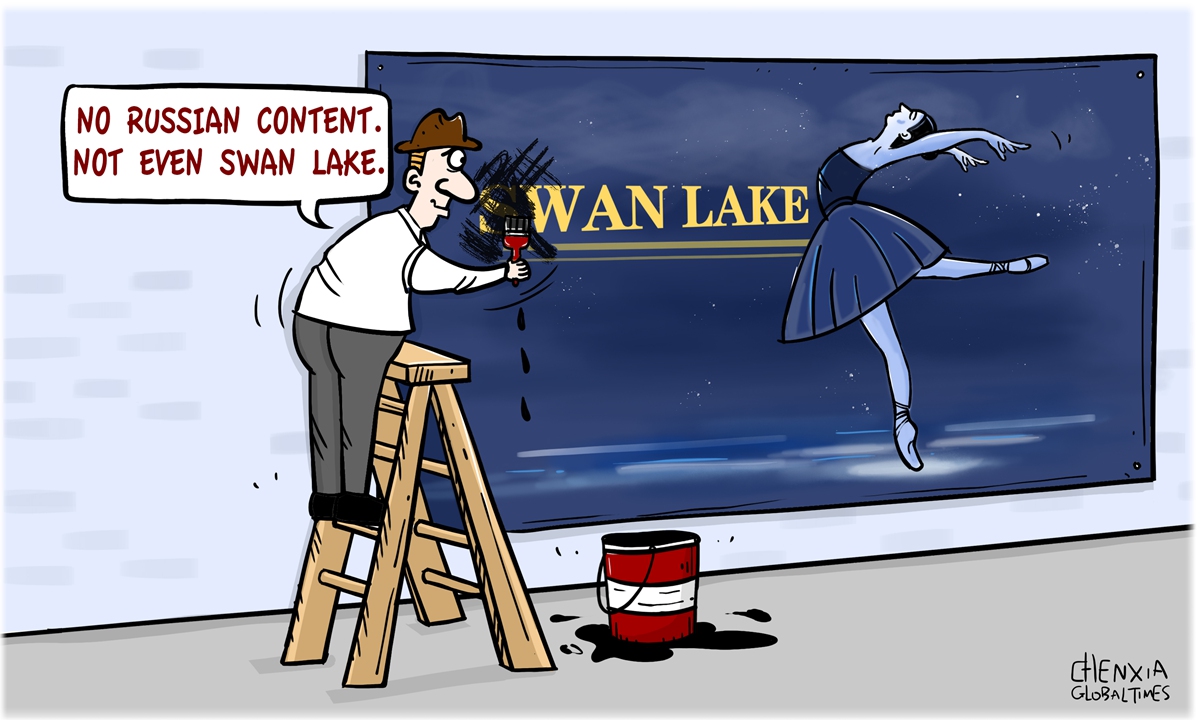
Illustration: Chen Xia/GT
The ongoing Ukraine crisis and the multifaceted competition between Russia and the US-led West are taking place against the backdrop of globalization that is encountering setbacks.
Russia does not oppose globalization. Moreover, it once tried to lean toward the West economically and politically after the dissolution of the Soviet Union and joined various Western-led international organizations. It was even a member of the G8.
It seemed that the West provided Russia with cooperation platforms. But why, after joining the G8 and the global economic system, did Russia's economic structure fail to enable it to reduce dependence on primary products like energy, food and minerals? Why didn't Russia achieve desired economic prosperity? This also points to a deeper question: Can Russia achieve prosperity by embracing globalization?
Scientific and technological innovation and industrial revolution are necessary but not sufficient conditions for the rise of countries in recent times. The degree of interest from the world market in a country determines not only the depth of scientific and technological development as well as the industrial revolution in that country, but also the limit of transforming technological progress into national economic strength. Those innovations are meaningless from an economic point of view if they cannot be translated into market demand.
At the economic level, globalization reflects the will of the dominant countries, but it is directly driven by multinational corporations, which follow the logic of business to maximize the return of capital. It is not interested in giving special favor to the latecomers or promoting the balanced development of the world. Instead, it selectively considers the place, scale and direction of capital investment based on market scale, transportation cost, industrial accumulation, education level as well as other factors as preconditions. Different countries have various attractiveness capacities for capital, which are important prerequisites for scientific and technological innovation and industrial revolution. Therefore, not any country can achieve this process.
In the 1990s and the first decade of this century, Russia thought that a Western-style development could be achieved by turning to the West, which soon proved to be an illusion. With a population of just over 140 million, Russia's market is small and separated. In addition, three of its four traditional industrial belts are far from ocean ports, making long-distance transport less convenient. These factors inhibit the global industrial capital from taking sufficient interest in Russia and raise the difficulty of absorbing development resources and upgrading the level of industrialization through globalization.
The attention of global capital, especially financial capital, to Russia is more focused on energy, food and minerals, which are Russia's high-quality assets and the sources for huge profits. However, if the privatization policy of the 1990s were to continue, Russia would have further reduced to a world supplier of primary products. Since Putin came to power, Russia has strengthened its control over key industries that are related to national security, which are not celebrated by foreign capital.
Russia launched the "special military operation" against Ukraine because of NATO's eastward expansion. This is a security issue, as well as an economic issue in the process of globalization. NATO's eastward expansion has also been a part of globalization since the 1980s.
A prominent phenomenon in the globalization initiated by the UK and Europe in the mid-to-late 19th and early 20th centuries is that military forces were used to remove political obstacles for capital expansion. This is also the case with the globalization led by the US in recent decades. Powerful non-capitalist countries are natural enemies of the capitalists. To crush the independent and national capabilities of these countries requires not only economic, political and ideological competition, but also military approaches. A consistent logic has driven the US to strengthen containment against China. That is, it's not merely a matter of "power competition," but also a result of clearing obstacles for free expansion of capitals.
In the capital-driven global network, a few countries are at the top of the pyramid due to their advantages in high-tech and financial industries and it's difficult for other countries to squeeze into this rank. Globalization will lead to a formation of a new division of labor system, and resources won't be evenly distributed among countries. After several rounds of NATO's eastward expansion and Western sanctions, Moscow has realized that NATO's eastward expansion has kept squeezing Russia's survival and development space. This is not only a security issue for the country, but also a matter of long-term development.
If this issue cannot be effectively dealt with, it's very likely Russia will be further locked in the position of a primary products provider, gradually losing its ability in major power competition and even seeing the emergence of an inner political crisis. This is a scene Russian political elites are unwilling to see. Therefore, the Russian government has been committed to building the Eurasian Economic Union and trying to shape its own economic development space. This is Russia's response to globalization.
The author is a professor at the School of International Relations and Public Affairs of the Shanghai International Studies University. opinion@globaltimes.com.cn




